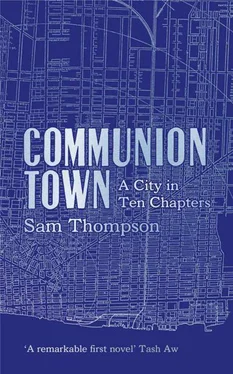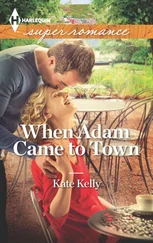1 ...7 8 9 11 12 13 ...57 In her room, late, I let her persuade me to play. She never asked if the songs were about her. Perhaps they made her shy, as nothing else did, or perhaps she understood better than me what a song really was. I had to keep myself from demanding more assurances, wanting her to guarantee that they were good enough — for what, I had no idea.
After graduating she took a job raising funds for a small, well-connected development charity. Spring was waking the city up just then, opening doors and windows, warming the separate streets into a single organism. Time felt spacious. If you woke early, the day was there waiting for you, untouched. Each morning the pitched window above her bed turned a fresh card from the deck of clear skies. Even a lunch-hour was wide enough to get lost in, and a free afternoon contained all possibilities. The dusks kept lengthening and you felt that if you took the right path, up the wynds past a paper-lanterned tea garden into the Old Quarter, or along the river, towards the sky’s end-of-the-world pinkness, you could follow the evening as far as you wanted and never reach nightfall.
I met her from work at the end of her first week in the job. The charity was based in a small city square whose limestone townhouses had been converted into solicitors’ and architects’ offices, advertising agencies and boutique business premises. She was bare-legged in a pleated dress. I had my guitar; I was seldom without it, now. We walked along Mino High Street, against a flow of young men with their suit jackets off and their ties loosened, and stopped for takeaway iced coffees.
As we left the café, she hesitated, handed me both of the cold plastic beakers and skipped back inside to visit the lavatory. I waited on the pavement, glancing over at a torpid down-and-out who sat with his forehead resting on his knees so that only his greasy wool cap was visible. As I stood there, a rusty noise like a sigh scraped from his chest. A few copper coins lay on the ground between his feet. I thought of adding to them, but my hands were full and I wasn’t sure whether I had any change. I closed my eyes to feel the sun on my face, and smelt hot tar and rotting vegetables. I hummed a song from the park.
She re-emerged from the coffee shop, took her drink and slipped something into my hand. It was a scrap of cotton, still warm. ‘Look after those for me,’ she said, and held my eye for a few seconds.
A few streets away we found a bridge, and, beside it, the top of a narrow brick staircase. I followed her down. The city’s canals were a sunken world, dank and green, hanging below street level like a reflection. Bright algae lay just under the surface of the water, clumped around the remnants of shopping trolleys and rotten planks, while above the waterline vegetation flourished on worn structures of brick. We walked the towpath, pushing through curtains of weeping willow and stooping along the tunnels. On the other side of the canal the unkempt ends of back gardens sloped down to the water. She kept just ahead of me, twitching away from my hands and hurrying us down the dozing watercourse until we found a place where you could leave the path to enter a strip of undisturbed woodland. Beyond it was a meadow, a place to learn about bark’s texture, damp earth and the taste of grass. Later I strummed my guitar.
One Sunday afternoon she sat curled on her sofa, reading Under the Net and threading the fingers of one hand in and out of my hair. I was cross-legged on the floor beside her, running through my finished songs. By now I had six or seven I was more or less happy with. As the city sailed towards summer, half the pubs in the central district were advertising folk-club nights, photocopied fliers for local gigs were pasted on every hoarding and bus shelter, and most coffee shops I passed seemed to contain a boy or a girl perched on a stool with an acoustic guitar. This evening I would play at my first open mic.
The one I’d chosen took place in the upper room of a pub on the Part Bridge. I’d gone last week, just to listen. As I practised, now, with my back against the sofa and her fingertips at my nape, I held in my mind the image of that dingy room with its low stools and tables and its corner stage one step up from the floor, under walls and ceiling papered with old theatre posters. Tonight the place would be packed with musicians pulling on pints and beer bottles, each waiting for a chance to perform. Some would be old hands who turned up every week, but others would be new. If you wanted to play you had to arrive early and sign up for your ten-minute slot with the pair of middle-aged men who ran the night.
Last week they had taken the first slot themselves, performing raucous, straightforward folk-pop with harmonica and twelve-string guitar, to the delight of the crowd. A mixture of acts had followed: shy singer-songwriters mumbled their private codes into their chests, picking sparingly at their guitars, while others, more extroverted, bashed at their instruments with no aim beyond getting everyone clapping along. One young man specialised in extended, string-snapping solos like a stadium rock star, and as he stepped down from the stage he held his guitar up at shoulder height to receive its due applause. A woman draped in green taffeta spent her allotted time with her eyes shut, using a wooden pestle to draw one continuous, weird note from a brass singing-bowl, and improvising in a high-pitched wail.
As I watched all this, it became clear that the stage was a bubble of delusions, and that these people had come here in pursuit of some mistaken idea of themselves. But then, halfway through the night, a mournful-looking, deep-voiced girl played a single song, honest and catchy and personal without a trace of self-absorption. While she sang I felt the presence of the whole city, live and real outside the beery room. Colours and textures opened in my head. Her lyrics were casual phrases, ordinary rhythms of speech with everyday flashes of anger, emphasis and silliness, as though she was just throwing together fragments of a conversation; but the words fell into patterns. Her playing riffled through me.
That was what I wanted, I knew, without articulating it to myself or really understanding why. I’d practised all I could. I’d borrowed her laptop to make demos, layering strumming underneath fingerpicking and working out harmonies to sing with myself. I had listened endlessly to these recordings, alert to their flaws and frailties, correcting and polishing. What did I want with the offhand approval of strangers? I didn’t know, but communing in secret with a laptop wasn’t enough. Two songs were ready to perform but I was hesitating over a third. Was it tender and truthful, or would it make that upstairs room fall uncomfortably silent? I uncrossed my legs, stretched my socked feet across the carpet, and began to play through the intro again.
She laid her book down. I looked around to find her glaring at me, and the words of the first verse faltered on my tongue. She let her breath out in a disbelieving snort.
‘You keep on playing that,’ she said. ‘I’m right here! What are you trying to tell me?’
I opened my mouth to explain that I had to practise for tonight, that I needed to work out whether it was ready to perform –
‘Yes, the damn open mic night, I know all about it,’ she said. ‘So what? You think you can keep on playing that song, over and over, and I’ll just sit here and listen?’
She had raised herself up against the arm of the sofa. I twisted around to face her, the guitar slipping from my lap with a soft discord.
‘Don’t interrupt me,’ she said, ‘I’m getting going now. Are you actually trying to torment me, is that it? Have I done something to deserve this?’ Her eyes were bright with frustration and, I noticed with a shock, also with tears. One brimmed over, then the other, brushing trails down her cheeks.
Читать дальше
Конец ознакомительного отрывка
Купить книгу












